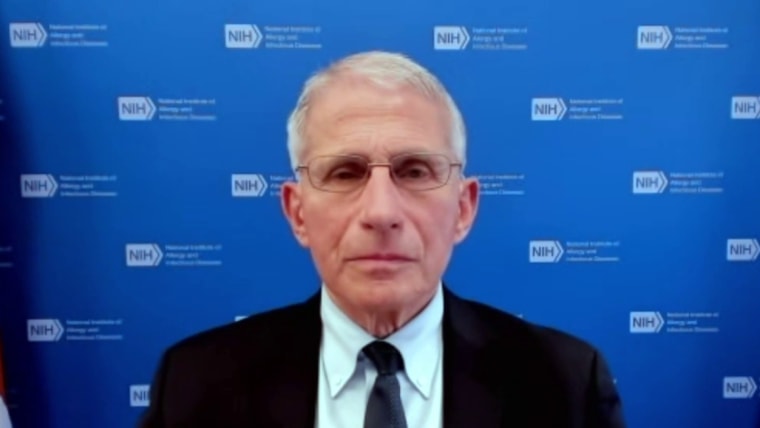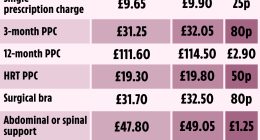More than 500 people are still dying of Covid-19 every day in the U.S., but an ample supply of a highly effectively antiviral drug is sitting on shelves, unused.
The drug, Pfizer’s antiviral pill Paxlovid, was authorized for emergency use for high-risk people in December. Clinical trials found that a five-day course cut a patient’s risk of hospitalization and death by 89 percent.
Full coverage of the Covid-19 pandemic
Supplies of the pills initially were extremely constrained, with limited doses doled out to states each week. As the omicron variant of the coronavirus spread, doctors and patients scrambled to find the pills.
Now, four months later, the supply of the potentially lifesaving medication has rapidly improved in the U.S., but in a twist, physicians don’t seem to be prescribing much of it.
There is plenty of Paxlovid to go around, but “it is being underutilized,” Dr. Anthony Fauci, the White House’s chief medical adviser, said Wednesday on MSNBC’s “Andrea Mitchell Reports.”
Getting the drug out to the public is critical at this moment in the pandemic, experts say.
The BA.2 omicron subvariant is leading to a rise in Covid-19 cases in the Northeast, and experts say hospitalizations and deaths could soon follow.
Paxlovid works by preventing the virus from replicating inside human cells before people get severely ill. It needs to be taken early to be effective — within five days of the onset of symptoms.
People, especially immunocompromised people who may not mount strong immune responses from the Covid vaccines, have few other treatment options; the omicron subvariant has rendered all but one U.S.-authorized monoclonal antibody drug ineffective.
Antivirals are “very valuable tools,” said Dr. Natasha Bagdasarian, Michigan’s chief medical executive. But on pharmacy shelves in her state, she said, thousands of doses of Paxlovid and another antiviral, from Merck, sit unused.
Bagdasarian said some doctors may hesitate to prescribe Paxlovid because it’s a relatively new medication and they may not feel comfortable offering it to patients.
She also noted doctors’ concerns about drug-to-drug interactions; the Food and Drug Administration doesn’t recommend Paxlovid for people with severe kidney or liver disease.
Other doctors may want to prescribe it but can’t because of the FDA’s limitations for using the drugs, said Dr. Ryan Maves, an infectious diseases and critical care physician at the Wake Forest School of Medicine in North Carolina.
Who is eligible for the Covid antiviral pills?
The FDA authorized the drug for people as young as 12 who are at high risk of severe disease and death from Covid.
“What do you do with someone with, like, mild asthma who’s maybe a little heavier than they need to be?” he asked. “You might want to give them the drug,” but they don’t qualify.
Another reason, Maves said, could be summarized in one word: awareness.
“I think part of the challenge is so early on there was such little supply, and getting ahold of it was a real challenge,” he said. “But the folks caring for patients who are at high risk may not know it is so much easier to get now.”
Bagdasarian said there has been “a bit of an uptick” in prescriptions in recent weeks in Michigan as the state has worked to get the word out to providers.
Download the NBC News app for full coverage of the Covid-19 pandemic
Dr. Paul Sax of Harvard Medical School and Brigham and Women’s Hospital said it is “frustrating” that the treatment isn’t being widely used. An antiviral pill that could be taken at home to treat Covid was something physicians wanted from the start of the pandemic, and now that it’s readily available, it’s not being prescribed.
Sax is pushing for U.S. officials to allow people in lower-risk groups to get the pill.
He may get his wish: In a presentation Monday at the Uniformed Services University of the Health Sciences in Bethesda, Maryland, Fauci suggested that officials were looking at expanding the use of the pills to more groups.
Sax also said the poor rollout could be due to testing rates that have dropped nationwide and because not everyone wants to pay for an at-home test.
The Biden administration’s “Test-to-Treat” program, announced last month, was supposed to increase awareness and make it easier to get tested and receive the pills in pharmacies. But the initiative, Maves said, is still a new one, so physicians may have to be more aggressive in getting high-risk people tested and then treated with the antiviral.
Fauci said on “Andrea Mitchell Reports” that federal and state health officials could do more.
“What we need to do a better job of is getting the practicing physician and health care providers on the outside the knowledge and realization that this is an available intervention,” he said.
Follow NBC HEALTH on Twitter & Facebook.
Source: | This article originally belongs to Nbcnews.com











